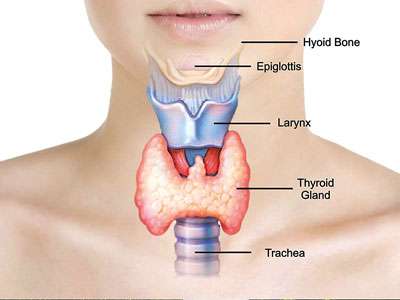31 Aug 2018 - {{hitsCtrl.values.hits}}

 Are you gaining weight and feeling unable to concentrate? Then it could be a problem with that little gland in your neck. Located above the Adam’s apple, the thyroid gland produces thyroid hormone which regulates, among other things, your body’s temperature, metabolism, and heartbeat. The thyroid gland influences almost all of the metabolic processes in your body. Thyroid disorders could range from small, harmless enlarged goiters to life-threatening cancers. The most common thyroid problems involve the abnormal production of thyroid hormones.
Are you gaining weight and feeling unable to concentrate? Then it could be a problem with that little gland in your neck. Located above the Adam’s apple, the thyroid gland produces thyroid hormone which regulates, among other things, your body’s temperature, metabolism, and heartbeat. The thyroid gland influences almost all of the metabolic processes in your body. Thyroid disorders could range from small, harmless enlarged goiters to life-threatening cancers. The most common thyroid problems involve the abnormal production of thyroid hormones.

Speaking to Health Capsule, Senior Lecturer in Clinical Medicine at the Faculty of Medicine -University of Colombo and Consultant Endocrinologist at the University Medical Unit - National Hospital of Sri Lanka, Dr. Prasad Katulanda explained about hypothyroidism, hyperthyroidism and other complications related to the thyroid gland.
Types of thyroid imbalance
According to Dr. Katulanda there could be several types of thyroid imbalance.
Hypothyroidism: This stems from a hormone deficiency. The body’s energy production requires certain amounts of thyroid hormones upsetting the body’s chemical balance, thereby lowering the energy levels in the body. Hypothyroidism is common particularly in children where there can be an absence of the gland or it may not be properly developed.
Congenital hypothyroidism: This is a condition where although the gland exist, the mechanism to produce the hormone may be abnormal due to genetic causes. This in turn would lead to mental retardation.
Symptoms of hypothyroidism
|
“Hypothyroidism is common in older children and adults,” continued Dr. Katulanda. “The commonest cause for Hypothyroidism was Iodine deficiency. But now in Sri Lanka and other countries Iodine is added to salt and therefore it is not a common cause anymore. However autoimmune hypothyroidism could occur where the body would produce antibodies which would act against the thyroxin hormone. This is known as thyroiditis and as a result the gland becomes inactive. In this case radioactive iodine needs to be given to patients with hypothyroidism.”
Hyperthyroidism: This is caused due to an overproduction of hormones. Speaking further he said that a common cause is Grave’s Disease. “This is also an autoimmune condition where the antibodies in the body would act as another hormone produced by the pituitary gland. This is known as the Thyroid Stimulating Hormone (TSH). Here the antibodies have structural similarities to that of TSH therefore there is an overstimulation of the thyroid gland. One common feature of Grave’s Disease is bulging eyes also known as exophthalmos.”
He further said that small nodules of the thyroid gland could get overactive also known as toxic adenoma of the thyroid gland. “This could also lead to hypothyroidism. On the other hand, the toxic multinodular goiter is the most cause of hyperthyroidism after Grave’s Disease. This is a thyroid gland which has autonomously functioning thyroid nodules where the hormones are stored for a period of time before they are being released,” Dr. Katulanda added.
He further said that hyperthyroidism could affect small children and lead to brain deficiency, forgetfulness and difficulty in thinking. It is common in children and females.
Treatments
In the case of under-production of hormones from the gland, thyroxin should be administered daily. According to Dr. Prasad thyroxin should be taken early in the morning, half an hour before the morning tea. “Treatments for over-production of hormones depend on the cause. In this case anti-thyroid medication could be given to the patients. In the case of Grave’s Disease definitive treatment is required because some pe ople will take medicine and then stop after a while. Radioactive Iodine treatment is recommended and it is given as a capsule or liquid which is safe.
But this is harmful if a patient is pregnant. Therefore, if patients are unable to go for radioactive Iodine treatment they can go in for a surgery. If you have an enlarged goiter, a surgery could be performed.”
Lowering the risk of thyroid abnormalities
Certain types of thyroid diseases are genetic and are unavoidable. However there are certain things you could do in order to prevent yourself from getting a thyroid condition or lowering the risk. These include :
Ensuring you have healthy iodine levels : Iodine from your diet is the key ingredient of the thyroid hormone your body manufactures. But if you are deficient in iodine, your body is unable to manufacture adequate amounts of thyroid, leading to hypothyroidism.
Stop smoking : Cigarettes contain the chemical thiocyanate which can damage your thyroid gland. Smoking not only increases the risk of a thyroid condition but it also makes it difficult to treat thyroid-related conditions.
Avoiding toxic exposures : A number of chemicals are found to be toxic to your thyroid gland. These are found in food, water and household products such as in anti-bacterial soaps, plastic products, carpets and fabrics and non-stick pans.
Using a thyroid collar during dental x-rays :
Frequent dental x-rays could expose your thyroid gland to unnecessary levels of radiation which could increase the risk of developing thyroid abnormalities.
Limiting the intake of soy foods: It is found that the overconsumption of soy foods could slow your thyroid’s production of hormones and impair your body’s ability to metabolise the thyroid hormone.
Avoiding raw goitrogenic vegetables: Eating raw forms of goitrogenic vegetables such as kale, broccoli, spinach and cabbage could slow down your thyroid gland and make you hypothyroid. Therefore make sure you steam or cook them prior to consumption.
Addressing Vitamin D deficiency: Vitamin D deficiency is associated with an increased risk of Grave’s disease and many other health challenges. Therefore Vitamin D therapy can significantly reduce thyroid antibodies and prevent overt hypothyroidism.
Testing for celiac disease: A common trigger for autoimmune thyroid conditions such as Grave’s disease is celiac disease which is the inability to process the protein gluten found in wheat and other grains. Undiagnosed celiac disease is a known trigger for elevated thyroid antibodies and thyroid disease.
Including Selenium : Research has shown that the mineral Selenium is very important for thyroid function. Therefore supplementing with Selenium can reduce thyroid antibodies. Moderate amounts of Selenium intake is recommended as higher levels could be toxic.
22 Dec 2024 3 hours ago
22 Dec 2024 3 hours ago
22 Dec 2024 6 hours ago
22 Dec 2024 6 hours ago
22 Dec 2024 6 hours ago